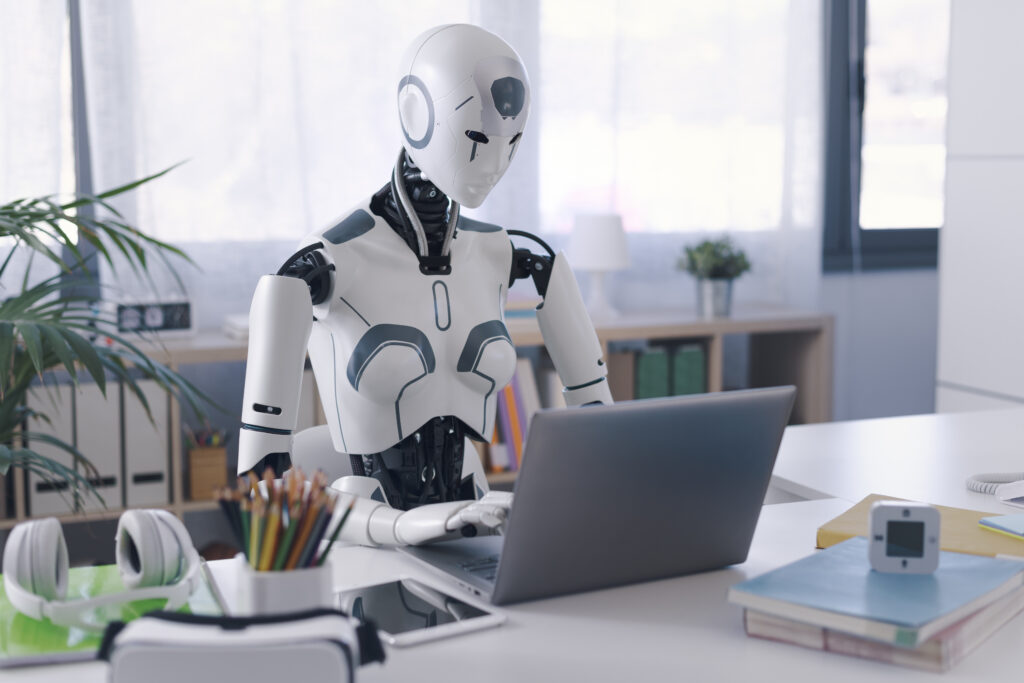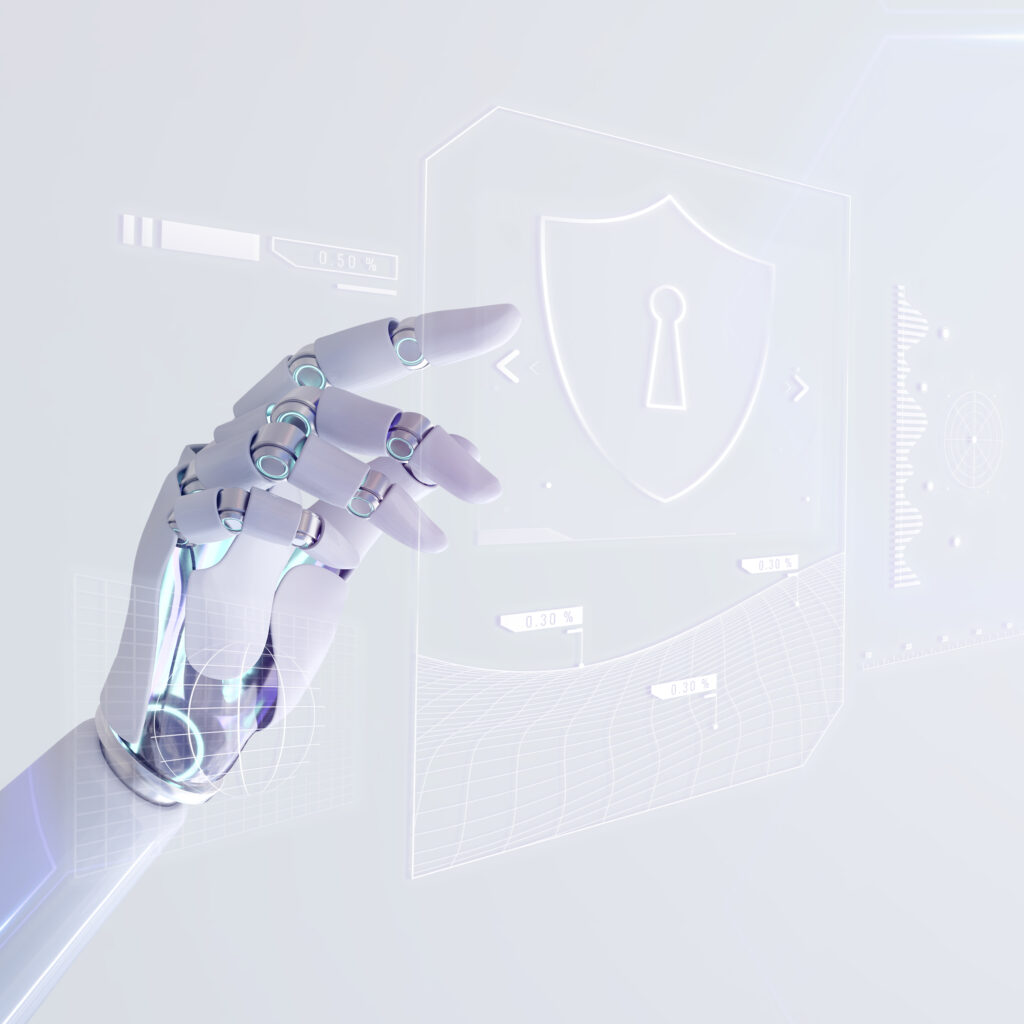Artificial Intelligence (AI) is no longer a new term in the tech world. With the advancements in machine learning, deep learning, and natural language processing, AI is revolutionizing how we work, communicate, and interact with the world around us. Given the difficulties that businesses face in finding talented developers, some may ponder whether AI could serve as a solution and potentially replace developers in the future. While this scenario may pose as an attractive cost-saving alternative for businesses, it would be a nightmare for developers. But does AI really have the power to make developers obsolete? In this article, we will delve into this topic and take a closer look at the advantages and the limitations of AI to finally answer the question whether developers will soon be a phenomenon of the past.
The Rise of AI in Development
AI is no longer a concept found only in science fiction movies. Today, AI is omnipresent and transforming industries like the healthcare industry, finance, e-commerce, or entertainment. With the emergence of Chat GPT it has even found its way into our classrooms.
The rise of AI has also had a significant impact on development and coding. One of the most intriguing questions surrounding AI and development is whether AI can write code. While the answer is technically ‘yes’, it comes with a significant caveat. There are already examples of AI being used to generate code in certain situations. For example, GitHub’s Copilot is an AI-powered tool that uses machine learning algorithms to suggest code snippets to developers as they work. Or CodeMend, an AI-powered tool that can fix common syntax errors in code. While these examples demonstrate AI’s enormous potential, these tools are not capable of writing entire applications from scratch, yet. However, the limitations do not negate the various advantages that AI offers to developers.
The Advantages of AI in Development
AI is providing developers with new tools and techniques that can help them work more efficiently and effectively. In this section, we will explore the advantages of AI in development and the ways in which it can assist developers in their work. By understanding the benefits of AI, developers can make better use of this technology to improve their work and create more effective software products.
1. Automate Repetitive Tasks

One of the most significant advantages of AI in development is its ability to automate repetitive tasks, such as testing, debugging, and deployment. This automation can help developers work more efficiently, allowing them to focus on more complex tasks that require their expertise. Tools like Jenkins, CircleCI, and Travis CI can automatically run tests on code as developers commit changes, reducing the risk of human error and increasing productivity.
2. Enhance Productivity
AI-powered tools like code completion, auto-refactoring, and intelligent IDEs can help developers write code faster and more efficiently. For instance, Microsoft’s Visual Studio IntelliCode uses machine learning algorithms to provide context-aware code completion suggestions to developers. The platform is built on machine learning algorithms that learn from over 14,000 open-source projects to provide relevant suggestions. This not only saves developers time but also helps to improve the quality of code by suggesting best practices and patterns. Another example is TabNine which can suggest code snippets to developers as they type. These tools can save time and reduce errors, as developers don’t have to remember every single syntax or API. Nevertheless, developers still need to understand the context of the code snippet and determine whether it is appropriate for the situation.
3. Improve Code Quality
Developers can write better code and reduce the risk of bugs and errors by using AI that can analyze code and provide suggestions for improvements. SonarQube, for example, is an open-source platform that uses AI to analyze code and detect bugs, vulnerabilities, and code smells. Similarly, Codacy is an AI-powered code quality platform that automatically reviews code changes and provides suggestions for improvement.
4. Predict Issues

Predictive analytics tools, such as GitHub’s CodeQL, can help developers anticipate and prevent potential issues before they occur. This way developers are able address problems proactively and reduce the risk of errors in the final product. CodeQL uses AI to identify potential security vulnerabilities in code, allowing developers to fix them before they become an issue. It works by analyzing code changes and comparing them to a library of known vulnerabilities. CodeQL can also detect new vulnerabilities by analyzing the behavior of code and looking for anomalies. By leveraging AI, CodeQL makes it easier for developers to ensure that their code is secure and free from vulnerabilities, without the need for extensive security expertise. Some AI tools can also analyze user behavior and predict when a website or application is likely to experience high traffic, so developers can prepare and prevent any potential downtime.
5. Personalize User Experiences
AI can analyze user data and behavior to provide personalized experiences, such as product recommendations or chatbots. For example, Netflix uses AI to provide personalized recommendations to its users, while chatbots like Mitsuku use natural language processing to provide conversational experiences to users.
6. Analyze Data to Develop Innovative Solutions
AI-powered tools can analyze vast amounts of data and identify patterns, providing insights that can inform development decisions, improve products, and lead to new product ideas and opportunities for optimization. They can even help companies enter new markets. Google Cloud’s BigQuery uses AI to analyze massive datasets and provide real-time insights into data trends and patterns. NVIDIA’s GauGAN AI software can transform rough sketches into photorealistic images, providing new possibilities for designers and developers.
7. Natural Language Processing
To write better documentation and improve communication with stakeholders developers can use AI-powered natural language processing. Writing assistants, such as GPT-3, Grammarly and ProWritingAid, can help write clear and concise documentation and code comments. Additionally, they can assist in generating code based on natural language inputs.
8. Detect Cybersecurity Threats

AI can detect and respond to cybersecurity threats, reducing the risk of data breaches and other security issues. For example, Darktrace is an AI-powered cybersecurity platform that uses machine learning algorithms to detect and respond to cyber threats in real-time.
9. Machine Learning
AI can be used to develop machine learning models, which can improve the accuracy and efficiency of various processes, such as data analysis and prediction. By leveraging AI-powered tools like Google’s open-source platform TensorFlow developers can build and train machine learning models. These models can be used to automate decision-making processes and improve the overall efficiency of software development.
Overall, AI has the potential to assist developers in many different areas of development. By leveraging the power of AI in areas such as automating repetitive tasks and enhancing productivity, developers can save time and effort that can be spent on more complex tasks that require their expertise.
The Limitations of AI
While AI has many advantages, it is not without its limitations. As with any technology, AI has its own set of challenges and drawbacks that developers must be aware of. In this section, we will explore the limitations of AI in development, examining the areas where AI falls short.
1. Lack of Human Creativity

One major limitation is that AI-powered tools can only do what they are programmed to do. While AI can automate repetitive tasks and provide solutions based on data analysis, it cannot replace the creative and intuitive thinking of human developers. Developers are often required to come up with innovative ideas or design unique user interfaces that meet specific user needs, which AI-powered tools may not be able to do.
2. Limited Ability to Handle Complex Tasks
AI has a limited ability to handle complex tasks that require human expertise and experience. While AI can automate simple tasks and provide solutions based on data analysis, it may not be able to understand the context of a problem, handle complex coding challenges, or make strategic decisions about project management. For example, AI-powered code completion tools may suggest code snippets that work in some situations but not in others. Developers must have a deep understanding of the problem at hand to determine whether the code snippet is appropriate for the situation.
3. Dependence on Quality Data
AI requires quality data to function effectively. If the data used to train an AI system is inaccurate or biased, it can lead to incorrect results or predictions. This means that developers need to ensure that the data used to train AI systems is accurate and representative of the problem they are trying to solve.
4. Lack of Emotional Intelligence

Finally, AI’s lack of emotional intelligence can be a challenge in applications that require empathy or human interaction. Development is not just about writing code and building applications; it is also about communication, collaboration, and teamwork. Human developers bring a level of empathy, emotional intelligence, and social skills that AI cannot match. Developers need to work with clients, stakeholders, and team members to understand their needs and provide solutions that meet their requirements. An AI-powered chatbot may be able to provide quick and efficient responses, but it may not be able to understand or respond appropriately to a user’s emotional state.
Will AI Make Developers Obsolete?
After taking this emotional rollercoaster ride through the exploration of the numerous advantages of AI for developers, followed by the examination of its limitations, we will finally address the most pressing question: Will AI make developers obsolete? The answer is no, not in the near future at least. While AI can automate many tasks and improve the efficiency and accuracy of development, it still lacks the creativity, intuition, and human expertise that developers bring to the table. Developers are not just code writers; they are problem solvers, critical thinkers, and creative minds. They understand the complexities of development and have the expertise to develop customized solutions that meet the unique needs of businesses and end-users.
Developers Need to Embrace AI
AI is still in its early stages of development, and there is a lot that it cannot do. However, AI has the potential to revolutionize the development world. As it continues to develop and improve, it will become a more integral part of development. Developers will undoubtedly face new challenges, but most importantly, AI is creating many new opportunities in development that were previously unimaginable. By embracing AI and being aware of its limitations, developers can work more efficiently, improve code quality, and develop innovative solutions. In short, they can leverage AI to its fullest potential.


